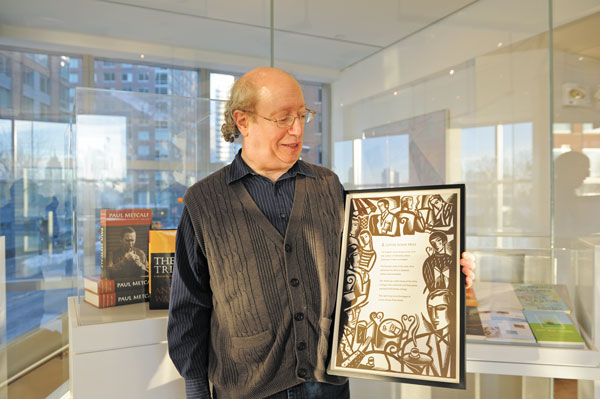
Allan Kornblum at Poets House:
In 1970, a young poet, Allan Kornblum, moved from New York City to Iowa City, taking the first steps in a 40-year career as editor and publisher of contemporary poetry. “His work has modeled behavior for a whole sector of our field in terms of bringing poetry to wider audiences,” said Poets House executive director, Lee Briccetti when she introduced Kornblum to a Poets House audience on Feb. 9.
At a time when small presses sprang up like daisies and faded just as quickly, Kornblum and his wife, Cinda, founded Toothpaste Press and its successor, Coffee House Press, which is still publishing the work of some renowned poets to whom Kornblum made a promise decades ago that he would be their lifetime publisher.
Over the years, many new poets have been added to the fold, as were writers of fiction. In July 2011, Kornblum became publisher emeritus, turning the reins of the Coffee House Press over to Chris Fischbach, a young man who he had mentored since Fischbach’s days at the press as an intern.
In two back-to-back lectures at Poets House, Kornblum talked about a publisher’s responsibility “for the selection, refinement, presentation, promotion and preservation of works of literature.”
He also talked about technological change from the days of the mimeograph machine, which is how small-run books were “published” when he started, to the Internet and about commercial considerations and pressures. He also gave advice about how poets and other writers need to prepare their manuscripts for successful consideration by a publisher.
“None of us will live to see all of the changes the Internet has begun to make to our daily lives and to the world,” Kornblum remarked, “nor will we see all the ramifications of the e-book on publishing, bookselling, reading and writing.”
He said that change was inevitable, but, he added, “the desire, the need and the pleasure of communicating through literature will always continue because it’s part of what makes us human — it’s part of what defines us as a species.”
An exhibition of broadsides, chapbooks and important first editions published by Toothpaste Press and Coffee House Press continues at Poets House through June 4. Poets House (www.poetshouse.org) at 10 River Terrace is open Tues. – to Fri., 11 a.m. to 7 p.m., and 11 a.m. – 6 p.m. Saturdays. Admission is free.

Desert Air at
the Winter Garden:
The exhibit of George Steinmetz’s photographs at Battery Park City’s Winter Garden through March 15 astonishes both because of his images of deserts in 27 countries and Antarctica and because of a video showing the photographer in action.
Strapped into a motorized paraglider that weighs less than 100 pounds including fuel, Steinmetz has hovered over desert landscapes at altitudes of more than 14,000 feet to almost 1,400 feet below sea level. He maneuvers his aircraft by leaning to one side or the other and by pulling on its Kevlar lines.
Steinmetz has said that he is obsessed by deserts. For more than 15 years, he has photographed their undulating sands, their icy pinnacles, their camel caravans, their wildlife and the hardy humans who make their home there. His award-winning photographs have appeared numerous times in National Geographic and GEO magazine in Germany, and now in a book called “Desert Air.”
Though Steinmetz has had a few mishaps, like landing in the ocean while photographing whales, getting dragged across a dry lake in a sandstorm and colliding with some trees that necessitated 19 stitches in his face, he says that he flies “prudently,” avoiding large forests, big cities, volcanic rocks and large expanses of water without a safety boat.
The exhibit does include a few shots of the crater of an active volcano, however, as well as pictures of people floating in the sunny Dead Sea, whose salinity would make it impossible to sink had the photographer inadvertently joined them.
“I do this kind of flying because it gives me the opportunity to photograph remote areas in a way that they have never been seen before,” Steinmetz said, “and in a way impossible with any other kind of aircraft. I’m a photographer who flies, not a pilot who takes pictures.”
Team Bubby cancer fundraiser:
Battery Park City residents who have lost loved ones to cancer, or who have survived it themselves, are mounting their bicycles on March 2 to raise money for cancer research. The relay-style team cycling event, Cycle for Survival, raised more than $17 million last year for research at Memorial Sloan-Kettering Cancer Center. Of that, $14,000 came from Battery Park City participants.
Calling themselves “Team Bubby,” the Battery Park City contingent was organized by Cecily Braden, and was named in honor of Battery Park City resident Andrew Forman’s mother, Joan Forman — nicknamed “Bubby” — who had cancer and who recently died.
On Feb. 21, Team Bubby will hold a fundraising party from 7 p.m. to 11 p.m. at the Regis Royal Upstairs Lounge, 21 Rector St., with a silent auction, raffle prizes, drink specials, appetizers, live music and dancing. All are welcome.
Among the Battery Park City residents riding this year are Andrew and Rosemary Forman, Denise DuBois, Lisa Younes-Powers, the Raskin family, Ava Garrett, who survived stage 4 non-Hodgkins lymphoma, and Patti Sietz-Honig, whose mother-in-law had breast cancer, whose husband, Michael, has had three kinds of cancer in the last five years, and whose two-and-a-half year-old grand nephew, Jake, has brain cancer and just completed his last chemo treatment. “‘Cycle for Survival’ is a way for me to fight back,” Sietz-Honig said.
“I’m in awe of the strength and the courage it takes to get to the other side,” said Braden, “and I ride with the goal of passing that along to the individuals and families who continue their battle.”
Asphalt Green update:
Though enticing advertisements for the Asphalt Green Battery Park City community center are prominent on the multimedia screen in the World Financial Center’s Winter Garden, there’s still no word as to when the Battery Park City Authority will complete post-Sandy renovations so the community center can open.
At the February meeting of Community Board 1’s Battery Park City committee, Paul Weiss, chief program officer for Asphalt Green, said that after the B.P.C.A. finishes its work on the facility, it would take six to eight weeks to open the center. “We have to rehire and retrain staff,” he said.
Before it became clear that the community center could not open in November 2011 as originally scheduled, or even within the next few months thereafter, Asphalt Green had conducted a membership drive offering significant discounts to those who signed up in advance of the opening. At the C.B. 1 meeting, Weiss said that because of the delays, around 250 to 300 people had asked for their money back. Others, he said, were still hopeful that the center would open soon. Weiss said that their money is being held in escrow in a bank account separate from Asphalt Green’s other funds.
To comment on Battery Park City Beat or to suggest article ideas, email TereseLoeb10@gmail.com. BY TERESE LOEB KREUZER



























